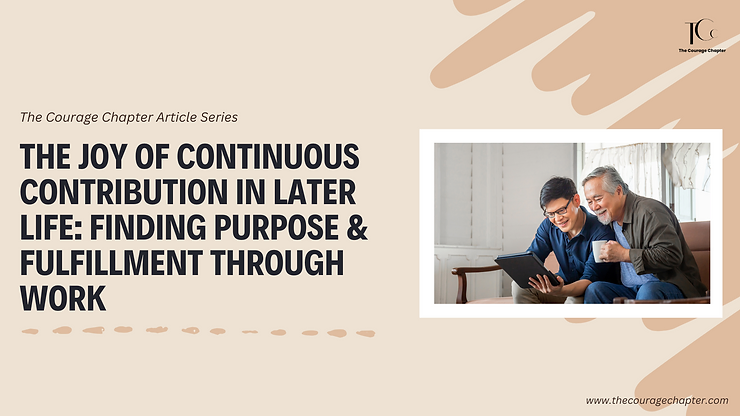A common misconception about aging is that one’s most productive years are behind them once they retire. However, research and real-life examples tell a different story: seniors who continue to work or engage in meaningful activities after retirement often experience renewed joy, purpose, and a sense of accomplishment. This phase of life offers opportunities not just for personal fulfillment but also for giving back to the community in impactful ways.
The Power of Purpose: Jane’s Story
Take Jane, a retired florist, as an example. After retiring, Jane anticipated a life of leisure, but soon realized that something was missing. It wasn’t the routine she craved—it was the sense of purpose that came from her work. Jane began volunteering at a local senior center, sharing her expertise by teaching floral arrangement workshops and helping to promote the center’s activities. Through this, Jane discovered that her knowledge and experiences still held immense value, both for her and for the community she served.
For many seniors like Jane, the desire to continue contributing doesn’t fade with age. Instead, it shifts focus. Many find new ways to offer their expertise and wisdom, not necessarily for financial gain, but for the joy of giving back. This sense of contribution plays a crucial role in maintaining mental and emotional well-being.
Work as an Avenue for Contribution
Whether it’s through paid employment, volunteering, or creative endeavors, work provides structure, social interaction, and a continued sense of relevance. For seniors, the motivation behind working often changes; it’s no longer about career advancement or financial necessity, but rather about staying connected, feeling needed, and continuing to make a meaningful impact.
A 2022 study by AshaRani et al. found that seniors who engage in work or volunteer activities post-retirement often report a higher sense of purpose and well-being. The study highlighted that the sudden drop in activity post-retirement can lead to a loss of identity and purpose, underscoring the importance of continued engagement in meaningful tasks. Furthermore, a survey conducted by the National Institute on Aging in 2023 found that seniors who participate in intellectually stimulating work or complex tasks experience slower cognitive decline and enjoy a better quality of life.
Mental and Physical Health Benefits
The health benefits of remaining engaged in work-related or volunteer activities are well-documented. Staying mentally and physically active in later life can reduce the risk of dementia, lower rates of depression, and even extend life expectancy. According to the National Institute on Aging, seniors who engage in work that challenges them cognitively through problem-solving, social interaction, and learning new skills and they tend to experience slower rates of cognitive decline. This concept of “occupational complexity” is particularly relevant in today’s workforce, as more companies explore ways to leverage the expertise of their older employees through mentorship programs, fractional consulting, and part-time roles.
More Than a Job: A Contribution to Society
For many, work after retirement doesn’t look like a traditional nine-to-five job. Many seniors find fulfillment in mentoring, volunteering, or pursuing long-held creative passions. These roles provide a way to contribute to society in a more flexible and meaningful way. For instance, a retired executive might choose to mentor young entrepreneurs, or a retired teacher could offer tutoring services at a community center. These contributions are invaluable, not just for the individuals involved but for the community as a whole.
A New Outlook on Contribution
As we rethink what it means to age, it’s important to recognize that the later years of life can be some of the most impactful. Senior professionals have the opportunity to give back in ways that enrich both their lives and the lives of others. Whether through paid work, volunteering, or creative endeavors, continuing to contribute can lead to a deeper sense of purpose and fulfillment.
Organizations that recognize and support this shift can benefit tremendously from the wisdom and experience that senior professionals bring to the table. By offering flexible work arrangements, mentorship opportunities, and roles that allow seniors to continue contributing, companies not only enrich their own operations but also help redefine what it means to grow older.
The joy of continuous contribution lies not only in personal fulfillment but in the positive ripple effects it creates across society. In this next chapter of life, the value of experience, wisdom, and purpose should not be underestimated—it’s a gift that benefits us all.
This article is contributed by The Courage Chapter.
👉It’s never too late to discover your purpose! Join The Courage Chapter community as a reternee for free here: https://www.thecouragechapter.com/apply-now

Leave a Reply